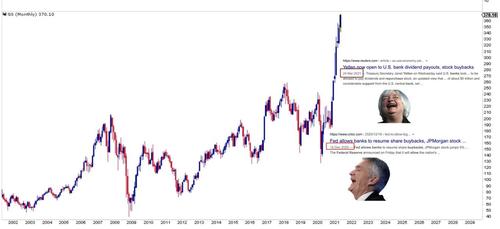Authored by Bruce Wilds via Advancing Time blog,
Unless you have the fortitude of a Greek God, peeling back the layers of our current "economic onion" will very likely bring you to tears. Looking back over the last several years could make a person argue that massive stupidity has been a huge factor in keeping the economy afloat. In short, those pulling the strings have constructed a false economy that is unsustainable and will at some point implode.

In most situations that I research it seems that as the investigation takes me deeper and deeper into the numbers I come upon some rather ugly realities that are difficult to face. In the metaphoric sense, the term peeling peel back the onion is an act someone undertakes in order to understand what lurks below. To expose the various layers of something investigators often find they have to peel away falsehoods and misconceptions to discover just how corrupt the message we are told truly is.
The area where most people seldom venture is protected by myths and half-truths. An example of this can be seen in America's relationship with China. For decades China exported deflation as it gladly traded cheap goods for jobs. That has come to an end, no longer is China's labor market the cheapest in the world. This is now beginning to show up in the cost China charges those buying its products.
The illusion of a robust economy has been propelled forward by the sheer "quantity" of financial growth and deficit spending rather than anything resembling quality. Poorly crafted and shockingly large spending bills have created a situation encouraging government agencies to spend like drunken sailors. It seems that again Federal agencies as well as state and local governments are flush with cash as the result of another stimulus package.
While most politicians would shy away from describing the infrastructure bill as stimulus spending that is exactly what it is. The bill is designed more as a way to create jobs and push the economy forward than improve the country's infrastructure. Now, state and local governments must rapidly appropriate and assign that money as they find they are now facing a "use it or lose it" situation. Such rapid spending generally does not utilize or allocate money in a way that maximizes results.

The Above Chart From Northmantrader.com Indicates, This Is Not "Normal"
A lot of things or issues are contained in the layers of our "economic onion." Things such as, How a huge amount of our so-called economic growth or GDP during the last decade has been in the healthcare sector. All the expensive new hospitals and buildings that line America's interstates sporting names such as UnitedHealthOne, Aetna, Humana, and Anthem stand as monuments to Obamacare. To be clear, that is not a good thing, all this has not drastically improved healthcare, it has simply driven the cost through the roof.
Then we have inflation which recently reached a 31 year high and appears to be heading higher. It is difficult to argue that wage inflation is on a rampage, at least in some sectors of the economy. When you see someone just out of high school with little or no training being offered north of $15 to take a low-level job that two years ago paid around $8 it is clear. Soaring food and energy prices are also adding to the mix.
Both of these issues dovetail with a massive growth in online retailing driven by companies being forced to compete with Amazon. America has yet to deal with the negative ramifications Amazon is showering upon it as it destroys small businesses in our communities. Yes, these are the same businesses that provide jobs for your neighbors, support local sports teams, and pay property taxes. Of course, Jeff Bezos did not do this alone, he had the help of politicians, our government, and the United States postal service, all of which joined in throwing brick and mortar retailers under the bus.
Another thing I wish to address here is how miss-leading claims of growing retail sales have squashed concerns the economy is in real trouble. Why would they not be higher, the recession caused by Covid-19 was the first in our history where even while millions of people were not working incomes rose. It should be noted much of the meager 1.7% rise in retail sales was due to inflation people, Yes, we are paying more for less, in some cases, a lot more.

Only Over Many Years Do We Gain True Perspective
Throw in the soaring national debt, the soaring trade deficit, soaring inequality, underfunded pensions, and a few other ugly issues, and tears should be streaming down the faces of all who want to leave the world better off for future generations. The distorted nature of our current market becomes apparent when you look closer at the society we are becoming as people walk along with their eyes glued to their cell phones.
In our rapidly changing world, decades of economic perspective are badly needed to understand today's financial markets. As a person who cares about and is concerned about the economy, I find it very disturbing that so many people have forgotten or never taken the time to learn recent financial history. By recent, I'm referring to the last fifty to one hundred years.
The further we look back in history, it could be argued that the relevance and lessons we have learned weaken because the economy and financial landscape of today is considerably different from that of our predecessors. Still, those without a long-term view or outlook of the economy wander about with what might be called "blind spots." This means, they may be unable to imagine or may miss possible scenarios as to how the world might react to unfolding events. I always marvel when I hear some young expert telling people how to invest by cranking out the wisdom they picked up in school only last year. Remember, if you decide they have all the answers, you may find yourself generating a fresh batch of tears.
Unless you have the fortitude of a Greek God, peeling back the layers of our current "economic onion" will very likely bring you to tears. Looking back over the last several years could make a person argue that massive stupidity has been a huge factor in keeping the economy afloat. In short, those pulling the strings have constructed a false economy that is unsustainable and will at some point implode.

In most situations that I research it seems that as the investigation takes me deeper and deeper into the numbers I come upon some rather ugly realities that are difficult to face. In the metaphoric sense, the term peeling peel back the onion is an act someone undertakes in order to understand what lurks below. To expose the various layers of something investigators often find they have to peel away falsehoods and misconceptions to discover just how corrupt the message we are told truly is.
The area where most people seldom venture is protected by myths and half-truths. An example of this can be seen in America's relationship with China. For decades China exported deflation as it gladly traded cheap goods for jobs. That has come to an end, no longer is China's labor market the cheapest in the world. This is now beginning to show up in the cost China charges those buying its products.
The illusion of a robust economy has been propelled forward by the sheer "quantity" of financial growth and deficit spending rather than anything resembling quality. Poorly crafted and shockingly large spending bills have created a situation encouraging government agencies to spend like drunken sailors. It seems that again Federal agencies as well as state and local governments are flush with cash as the result of another stimulus package.
While most politicians would shy away from describing the infrastructure bill as stimulus spending that is exactly what it is. The bill is designed more as a way to create jobs and push the economy forward than improve the country's infrastructure. Now, state and local governments must rapidly appropriate and assign that money as they find they are now facing a "use it or lose it" situation. Such rapid spending generally does not utilize or allocate money in a way that maximizes results.

The Above Chart From Northmantrader.com Indicates, This Is Not "Normal"
A lot of things or issues are contained in the layers of our "economic onion." Things such as, How a huge amount of our so-called economic growth or GDP during the last decade has been in the healthcare sector. All the expensive new hospitals and buildings that line America's interstates sporting names such as UnitedHealthOne, Aetna, Humana, and Anthem stand as monuments to Obamacare. To be clear, that is not a good thing, all this has not drastically improved healthcare, it has simply driven the cost through the roof.
Then we have inflation which recently reached a 31 year high and appears to be heading higher. It is difficult to argue that wage inflation is on a rampage, at least in some sectors of the economy. When you see someone just out of high school with little or no training being offered north of $15 to take a low-level job that two years ago paid around $8 it is clear. Soaring food and energy prices are also adding to the mix.
Both of these issues dovetail with a massive growth in online retailing driven by companies being forced to compete with Amazon. America has yet to deal with the negative ramifications Amazon is showering upon it as it destroys small businesses in our communities. Yes, these are the same businesses that provide jobs for your neighbors, support local sports teams, and pay property taxes. Of course, Jeff Bezos did not do this alone, he had the help of politicians, our government, and the United States postal service, all of which joined in throwing brick and mortar retailers under the bus.
Another thing I wish to address here is how miss-leading claims of growing retail sales have squashed concerns the economy is in real trouble. Why would they not be higher, the recession caused by Covid-19 was the first in our history where even while millions of people were not working incomes rose. It should be noted much of the meager 1.7% rise in retail sales was due to inflation people, Yes, we are paying more for less, in some cases, a lot more.

Only Over Many Years Do We Gain True Perspective
Throw in the soaring national debt, the soaring trade deficit, soaring inequality, underfunded pensions, and a few other ugly issues, and tears should be streaming down the faces of all who want to leave the world better off for future generations. The distorted nature of our current market becomes apparent when you look closer at the society we are becoming as people walk along with their eyes glued to their cell phones.
In our rapidly changing world, decades of economic perspective are badly needed to understand today's financial markets. As a person who cares about and is concerned about the economy, I find it very disturbing that so many people have forgotten or never taken the time to learn recent financial history. By recent, I'm referring to the last fifty to one hundred years.
The further we look back in history, it could be argued that the relevance and lessons we have learned weaken because the economy and financial landscape of today is considerably different from that of our predecessors. Still, those without a long-term view or outlook of the economy wander about with what might be called "blind spots." This means, they may be unable to imagine or may miss possible scenarios as to how the world might react to unfolding events. I always marvel when I hear some young expert telling people how to invest by cranking out the wisdom they picked up in school only last year. Remember, if you decide they have all the answers, you may find yourself generating a fresh batch of tears.

